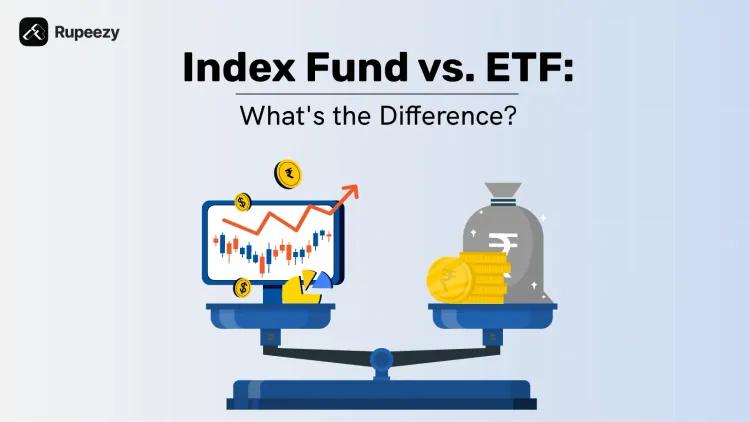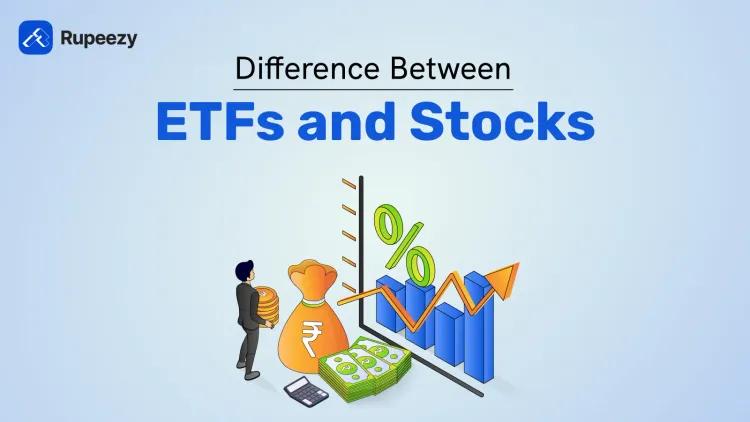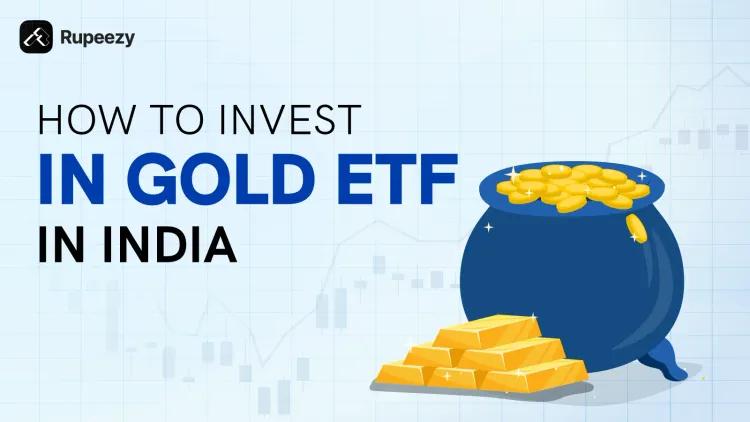Best ETF in India to Invest in 2026


00:00 / 00:00
Exchange-traded funds or ETFs are one of the investment options for investors who are looking to invest in various asset classes such as bonds, stocks, Indices, and commodities. ETFs commonly track the performance of underlying assets such as indices, bonds, commodities, etc.
In this article, let's explore the list of the best ETFs in India. Read on to learn more
What are ETFs?
ETFs or exchange-traded funds are like index funds which are marketable securities that follow the index, Commodity, bonds, and other assets. ETFs are available to buy or sell at stock brokerage platforms and they offer the utmost transparency to investors.
ETFs are funds that track indexes such as CNX Nifty or BSE Sensex, among others. When one buys the shares/units of an ETF, one is buying shares/units in a fund that tracks the yield and return of its native index. The differentiation between ETFs and all the other forms of index funds is that ETFs never try to beat their corresponding indexes, instead, they replicate them. They don't strive to beat the market but they strive to be the market.
List of Best ETF to Invest in India
ETFs | AUM |
CPSE ETF | Rs..42,632.15 Cr |
Nippon India ETF nifty 50 BeES | Rs.29,369.60 Cr |
ICICI Prudential Nifty 50 ETF | Rs.17,419.90 Cr |
Nippon India ETF nifty Midcap 150 | Rs.1,688.87 Cr |
Bharath 22 ETF | Rs.18,903.54 Cr |
UTI nifty next 50 ETF | Rs.2,375 Cr |
SBI nifty Next 50 ETF | Rs.2,859 Cr |
Motilal Oswal NASDAQ 100 ETF | Rs.7,988.16 Cr |
Nippon India ETF Nifty PSU Bank BeES | Rs.2,759.48 Cr |
Aditya Birla Sunlife Nifty 50 ETF | Rs.2,526.65 Cr |
NOTE: These ETFs are chosen based on their 5-year return and AUM and the data entered is as of 14th August 2024.
Best ETF to invest in 2026
Below we will discuss the best ETFs in India in detail:
1. CPSE ETF
CPSE ETF, one of the best ETFs in India, tracks the performance of the CPSE index (Central Public Sector Enterprise) and invests in the securities same as in the index. This index is comprised of public-sector enterprises. The shareholding pattern of this scheme majorly includes companies such as NTPC, Power Grid Corporation of India, Bharat Electronics, and Coal India.
Particulars | Figures |
AUM | Rs..42,632.15 Cr |
EOD | Rs.102.90 |
Volume | 30,91,846 |
3-year Return | 57.17% |
5-year return | 34.85% |
Expense ratio | 0.05% |
2. Nippon India ETF Nifty 50 BeES
Founded on 28 Dec 2001, This scheme aims to provide returns by mirroring the nifty 50 index which is mainly comprised of companies with financial services, IT, Oil, gas, and consumable fuels. This is an equity large-cap fund and falls under a very high-risk bracket.
Particulars | Figures |
AUM | Rs.29,369.60 Cr |
EOD Price | Rs.271.44 |
Volume | 25,49,565 |
3 Year Return | 14.76% |
5-year return | 18.43% |
Expense ratio | 0.04% |
3. UTI Nifty Next 50 ETF
Incepted on 4th, Aug 2017, this Scheme is managed by Unit Trust of India. It aims to provide returns by tracking and mirroring the performance of the index nifty next 50 which includes companies that come after the top 50 stocks in the order of Nifty indices. This is an equity large-cap fund having very high-risk levels
Particulars | Figures |
AUM | Rs.2,375 Cr |
EOD Price | Rs.76.81 |
Volume | 93,751 |
3 Year Return | 22.78% |
5-year Return | 23.70% |
Expense ratio | 0.00% |
4. Bharat 22 ETF
This is a very highly risky scheme that majorly consists of Equity large-cap stocks that follow and reflect the S&P BSE Bharat 22 Index. This scheme was founded on 24th, Nov 2017 and managed by ICICI. The company has major holdings in companies such as L&T, ITC, Power Grid Corporation, NTPC, Axis Bank, and SBI. etc
Particulars | Figures |
AUM | Rs.18,903.54 Cr |
EOD Price | Rs.116.45 |
Volume | 15,44,565 |
3 Year Return | 41.01% |
5 Year return | 28.33% |
Expense ratio | 0.05% |
5. SBI nifty Next 50 ETF
SBI nifty Next 50 ETF tracks the performance of the Nifty next 50 to invest in that index and provide returns. This scheme was incepted on 25th, March 2015 and managed by the State Bank of India. This is an equity large-cap fund with very high-risk levels.
Particulars | Figures |
AUM | Rs.2,859 Cr |
EOD Price | Rs.765.20 |
Volume | 27,103 |
3 Year Return | 22.73% |
5-year return | 23.54% |
Expense ratio | 0.15% |
6. Motilal Oswal NASDAQ 100 ETF
Motilal Oswal NASDAQ 100 ETF is an equity global fund and was founded on 29th, March 2011. It follows the benchmark index of NASDAQ 100 which is comprised of the top 100 companies that are listed in the NASDAQ. The funds holding mainly consists of tech giants such as Apple Inc., Microsoft Corp, Amazon, and Nvidia Corp.
Particulars | Figures |
AUM | Rs.7,988.16 Cr |
EOD Price | Rs.151.78 |
Volume | 3,14,954 |
3 Year Return | 11.64% |
5 Year return | 23.33% |
Expense ratio | 0.58% |
7. Nippon India ETF Nifty Midcap 150
Nippon India ETF Midcap 150 as the name suggests, follows and reflects the nifty Midcap 150 index which is comprised of the top 150 mid-cap companies listed in NSE. This is a 5-year-old fund which was incepted on 31st, Jan 2019. This is an equity midcap fund having very high-risk levels.
Particulars | Figures |
AUM | Rs.1,688.87 Cr |
EOD Price | Rs.136.02 |
Volume | - |
3 Year Return | 27.03% |
5-year return | 30.54% |
Expense ratio | 0.21% |
8. Aditya Birla Sun Life Nifty 50 ETF
Incepted on 22nd, Jan 2011, This fund tracks the performance of the nifty 50 Index to generate returns. This company majorly holds shares in companies such as HDFC Bank, Reliance Industries, ICICI Bank, Infosys, ITC, and L&T. This is an Equity large-cap fund and the risk level is very High.
Particulars | Figures |
AUM | Rs.2,526.65 Cr |
EOD Price | Rs.27.93 |
Volume | 3,26,411 |
3-year Return | 14.77% |
5-year return | 18.45% |
Expense ratio | 0.04% |
9. Nippon India ETF Nifty PSU Bank BeES
This fund is managed by Nippon India and was incepted on 25th, Oct 2007. It aims to provide returns by tracking the Nifty PSU bank Index which is comprised of top-performing banking companies. The fund holds shares in top banking companies mainly such as SBI, Bank of Baroda, Canara Bank, Punjab National Bank, and Union Bank. This is an equity-sector- financial services Fund with very high-risk levels.
AUM | Rs.2,759.48 Cr |
EOD Price | Rs.77.09 |
Volume | 20,29,894 |
3-year Return | 42.71% |
5-year return | 22.17% |
Expense ratio | 0.49% |
Turn Over | 125% |
10. ICICI Prudential Nifty 50 ETF
This is an 11-year-old fund and was incepted on 23rd March 2013. This fund is managed by ICICI and it tracks the performance of the Nifty 50 index to generate revenues. The shareholding of the fund mainly includes companies such as HDFC Bank, Reliance Industries, ITC, Infosys, and ICICI Bank. This is an equity large-cap fund with very high-risk levels.
Particulars | Figures |
AUM | Rs.17,419.90 Cr |
EOD Price | Rs.269.94 |
Volume | 13,76,497 |
3-year Return | 14.77% |
5-year return | 18.44% |
Expense ratio | 0.03% |
Read our latest blogs to learn more about ETF vs Stock, ETF vs Index Fund and Gold ETF vs Gold Mutual Fund
Benefits of ETF
Lower Costs
Generally, ETFs have reduced operating costs since most investment vehicles are only passively managed. In addition, this means less cost associated with portfolio management and administration. Another key reason is that ETFs do not charge for 12b-1 fees, or annual marketing fees like some mutual funds do, which helps keep the expense ratios much lower.
Trading Flexibility
Unlike mutual funds, which are traded only at the end of the trading day, ETFs can be bought and sold on stock exchanges throughout the day at market prices. This intraday trading feature allows an investor to act promptly on changes in the market and provides them with the option of implementing various strategies such as short selling or margin trading.
Diversification
ETFs provide instant diversification, as investors can avail themselves of a broad base of securities through one fund. The securities can be stocks, bonds, commodities, or other classes of assets. This kind of exposure would decrease the risk involved in investing in single securities.
Tax Efficiency
Compared to mutual funds, ETFs are more tax-efficient. The very structure of a fund means that ETFs usually realize less in the way of capital gains, as an investor will have to pay taxes only after selling their shares in an ETF. Normally, mutual funds distribute capital gains to their shareholders; this means immediate tax liabilities for the holders.
Transparency
ETFs are more transparent about their holdings. This is because most ETFs disclose their holdings daily. Any investor can know, at any time, precisely the kind of assets held by the fund. This can create trust and allow for more informed decision-making.
Immediate Reinvestment of Dividends
ETF dividends, generally, are immediately reinvested; thus, returns are compounding faster than in mutual funds, where reinvestment depends on timing.
How to Invest in ETF?
Set Your Investment Goals: Determine your financial goals and risk tolerance.
Choose an ETF. Research ETFs, compare the expense ratio, and compare past performance.
Choose Your Brokerage: Open a Demat account with a good organization, such as Rupeezy.
Fund Your Account: Transfer money to your Rupeezy brokerage account.
Rebalance: Monitor performance periodically and rebalance the portfolio as needed.
Conclusion
Some of the opportunities available to an investor through the top 10 ETF funds in India include long-term growth, income, or simply sector-based investments. These best ETFs in India would also provide an investor with low-cost methods to access the broad market, which ranges from equity to gold and sectoral funds. Given that, what becomes important is structuring your ETF investments according to your goals and risk tolerance for investing investors are advised to do their own research before investing.
Make the most of hassle-free investing with Rupeezy one of the efficient stockbroking platforms. Use it for effortless access to all of the above-mentioned best ETFs in India. Build a portfolio efficiently at Rupeezy, where you have the support to invest wisely in keeping your financial goals within your reach.

All Category










